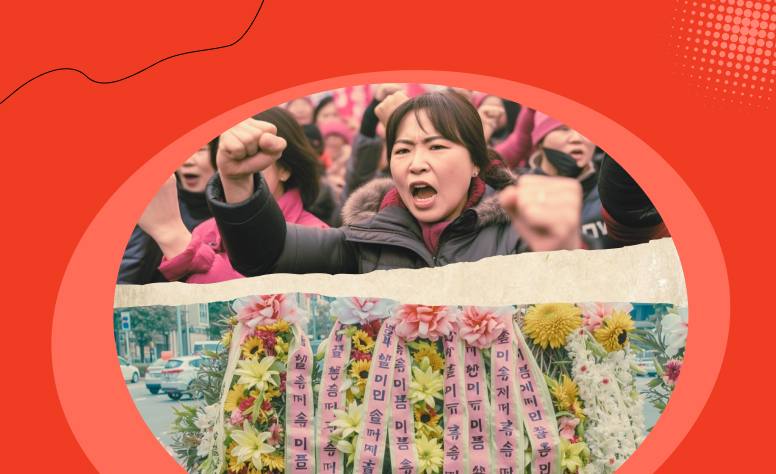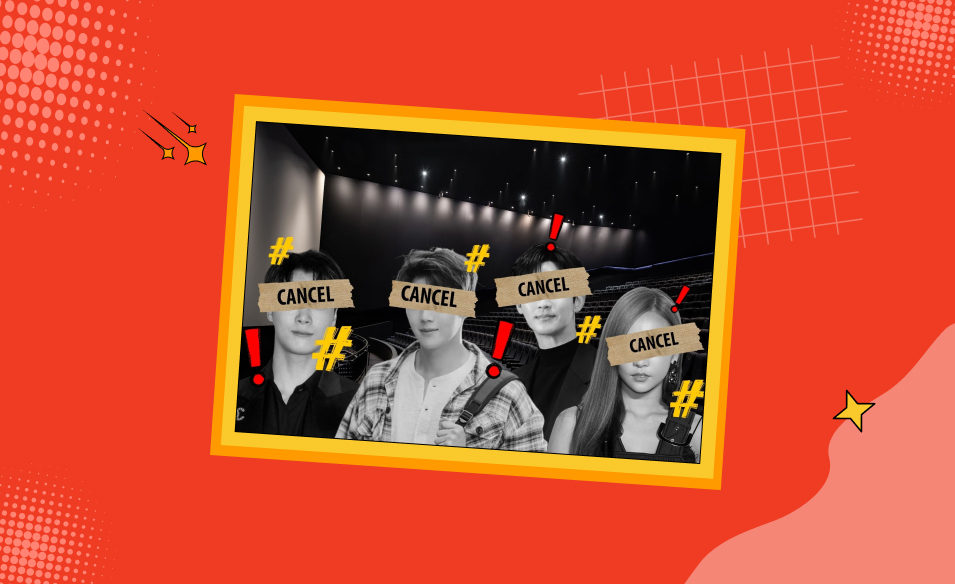Table Of Content
- What Is The Concept of Cancel Culture?
- What Is The Psychological Impact Of The Cancel Culture?
- South Korea’s Cancel Culture: A Harsh and Unforgiving System
- What Is An Example Of Cancel Culture In Korea?
- Is Precision Cancelling The New Child Of Cancel Culture?
- South Korean Celebrities Who Are the Victims Of Precision Cancelling
- 1. Seventeen And The AI Controversy
- 2. Allegations Against Hynjin For Bullying
- 3. Partner Abuse Allegations Against KinSeon-Ho
- 4. Alleged Controversies Of G-Dragon As An Addict
- 5. Allegations Against Kim Garam of Bullying
- What Is Driving South Korean Artists To Commit Suicide?
- The Rise Of Copycat Suicides: Is Cancel Culture Becoming Lethal For All?
- My Takeaway
I usually write about the limelight and bling of Kpop. Although I have also written about the stifling cases of hustle culture in Korea, I think it’s time I address the real devil in the room.
I am not going to beat around the bush; I know you have all heard of the toxic concept of cancel culture that prevails in the South Korean entertainment industry.
I have seen so much poisoned news regarding this toxic culture, I felt like, what was the point of it all?
In this article, I will discuss the various ways cancel culture has impacted my beloved K-pop industry and the individuals who have been its victims.
What Is The Concept of Cancel Culture?
If I have to explain in simple terms, I will say that cancel culture is a form of social boycott or public shaming.
What happens here? It is where support for a person, organization, or idea is withdrawn.
Of course, the immediate question that comes to mind is, why? Due to actions or statements deemed offensive or unacceptable.
It often involves public condemnation, online harassment, and attempts to ostracize the targeted individual or entity from social and professional circles.
What Is The Psychological Impact Of The Cancel Culture?
Cancel culture can have a profoundly negative impact on individuals’ psyches.
This included both those targeted by it and those who witness or participate in it.
These impacts include increased anxiety, social isolation, and self-censorship, potentially leading to long-term mental health issues like depression and even suicidal thoughts.
K-pop idols who have been directly or indirectly canceled experience emotional distress, reputational damage, and public humiliation.
This can lead to a cycle of fear and repression of free speech. Bystanders may also experience anxiety, fearing they could be next, and may choose to remain silent to avoid potential backlash.
South Korea’s Cancel Culture: A Harsh and Unforgiving System

In South Korea, “cancel culture” manifests as a form of public accountability, particularly within the entertainment industry.
Here, celebrities facing controversies can experience a significant impact on their careers.
This often involves a “precision canceling,” where the response is targeted to specific issues, leading to:
- Loss of endorsements
- Project withdrawals
- Reduced public appearances
What Is An Example Of Cancel Culture In Korea?
South Korea’s entertainment industry has seen a troubling number of young celebrities die in recent years, with many taking their own lives.
The recent death of Kim Sae Ron, a 24-year-old actress, on February 16, brings this painful issue back into focus.
Kim Sae Ron now joins a tragic list of stars who have died young, with many facing similar struggles.
Moonbin, Sulli, Jonghyun, and Goo Hara are just a few names that highlight the heavy pressures of fame.
These suicides are not isolated cases; they show deeper problems within the entertainment industry.
Is Precision Cancelling The New Child Of Cancel Culture?
Precision canceling is a new tactic employed by some fans or malicious individuals to harm the reputations of high-profile individuals or brands.
These individuals gather and spread harmful information or false rumors that can damage a reputation.
Social media facilitates the rapid spread of these negative stories. Therefore, fans, celebrities, and companies need to verify information carefully before believing it, as their careers may depend on knowing what is true and what is not.
South Korean Celebrities Who Are the Victims Of Precision Cancelling
I am going to discuss incidents where the notion of precision cancelling seems prevalent.
1. Seventeen And The AI Controversy
I first read the Seventeen x AI controversy in a BBC article. It claimed that Seventeen had utilized AI to create music, sparking widespread concern.
However, Woozi, a member and producer of Seventeen, along with their management agency, PLEDIS Entertainment, quickly denied these claims.
Woozi clarified on Instagram that he has explored AI technology, but it has not been utilized in their songwriting.
PLEDIS backed this up, leading the BBC to update the article. Fans initially felt that the media outlet’s approach was dismissive, resulting in a significant backlash.
This situation highlighted the ongoing debate in the music industry about the role of technology in music creation.
I also feel it shows the need for prompt and clear responses to counter false claims and safeguard the brand’s reputation.
Seventeen’s prompt communication on social media successfully addressed the AI allegations and preserved their image as genuine musicians.
This incident underscores the importance of being open and transparent in maintaining an artist’s credibility in the face of industry criticism and fan expectations.
It also emphasizes how Seventeen has maintained its creative control and artistic integrity as a self-made group.
2. Allegations Against Hynjin For Bullying
Hyunjin from Stray Kids faced serious allegations of school bullying in early 2021, leading to a public debate about whether a celebrity’s past actions should affect their current career.
This situation illustrates how specific accusations can lead to targeted consequences, even without legal proof.
Hyunjin’s management, JYP Entertainment, employed a strategic approach in their response.
Hyunjin publicly apologized, met with his accuser, and took a break to reflect—this thoughtful response aimed to handle the allegations while trying to save his career.
However, by March 2024, some fans still wanted him removed from the group, illustrating the lasting impact of targeted canceling.
The Hyunjin case highlights the challenge K-entertainment personalities face: they need to be accountable for their past while also continuing their careers. Public opinion plays a big role in shaping these outcomes.
3. Partner Abuse Allegations Against KinSeon-Ho
I have read The Story of Kim Seon-ho in detail, and to me, it shows how public backlash can impact careers in K-entertainment.
Kim faced serious criticism when his ex-girlfriend accused him of emotional abuse and forcing her into an abortion.
I saw the news of his admission to these claims and apologized, which could have ruined his career.
The situation worsened when his support for actor Nam Joo Hyuk, who faced allegations of bullying, sparked further criticism.
Despite this, many people forgave Kim due to his heartfelt apology and a statement from his ex-girlfriend.
Support from colleagues and fans, along with his talent and professionalism, helped shift attention back to his work.
This case shows how targeted backlash in K-entertainment can threaten careers based on specific actions or connections.
4. Alleged Controversies Of G-Dragon As An Addict
I cannot believe I am reliving this once again. My favorite, G-Dragon from BIGBANG, is an example of how cancel culture can be avoided in K-entertainment when accusations are unfounded.
In October 2023, he faced serious allegations of drug use that could have had serious consequences for his career.
However, he was acquitted of all charges. This case shows that when there is no evidence to support allegations, an artist can continue their career.
Despite the risks of negative stories leading to cancellation attempts, G-Dragon was able to keep his career and take on new projects.
This incident highlights how the industry can respond appropriately when evidence does not back cancelation.
Additionally, it also highlights the delicate balance between holding someone accountable and unfairly punishing them in the K-pop industry.
5. Allegations Against Kim Garam of Bullying
The situation involving Kim Garam and Le Sserafim illustrates how accountability operates within the K-pop industry.
Garam was quickly removed from the group. Additionally, both Source Music and Hybe Corporation terminated her contract.
This happened soon after her debut, highlighting how fast public opinion can shift in the age of social media.
However, similar incidents in K-pop can yield very different outcomes. For example, Garam’s career effectively came to an end.
This suggests that the effects of cancel culture vary and may depend on factors such as
- The type of allegations
- Their veracity
- The person’s response
- How management addresses the matter
What Is Driving South Korean Artists To Commit Suicide?
I have witnessed a number of celebrity suicides due to the extreme consequences of this cancel culture.
See, I once mentioned the effects of hustle culture, right? All of these are immensely interconnected.
When I mentioned the effects of hustle culture, I referred to the notorious work culture prevalent in the South Korean entertainment industry.
Especially, the Kpop industry has led to the terrible results of mental anxiety and depression among the idols.
I think we should raise this question very seriously now. It’s high time, guys!
Additionally, the high suicide rates of the idols are leading to something far more dangerous. I am talking about the rise of Copycat Suicides.
The Rise Of Copycat Suicides: Is Cancel Culture Becoming Lethal For All?
I have already mentioned that in recent years, there have been several celebrity suicides in South Korea.
What I haven’t spoken of yet is that these suicides might lead to more suicides, particularly from 2005 to 2008.
I read the paper about seven celebrity suicides, using the Korean Integrated Newspaper Database System (KINDS), and considered four time periods of 28 days after each celebrity’s death.
Additionally, I even read about logistic regression analysis to determine if certain subgroups, similar to each celebrity, had more suicides.
The results showed significant increases in suicide risk during these periods. Notably, there were large rises in suicides among groups that closely identified with the celebrities, particularly where factors like sex, age, and method matched.
I can confirm that a strong copycat effect occurred after these celebrity suicides, especially among fans.
It suggests that South Korea should consider better media practices when reporting on celebrity suicides.
My Takeaway
Ah! It was a huge way till here, wasn’t it? Whenever I read such news, I always ask myself, how draining it can be once you are in the situation.
I know I have written a quarter article bashing and shaming the cancel culture, and I mean every single word of it.
I imagine how Jongyun’s sister might have felt, how Sae Ron’s parents might have felt, and I curse this culture even more.
However, then I hear about the atrocities of the Kpop idol Moon Tae-il, who is still not sure whether he will get his deserved punishment or not.
These are the times when I feel like nothing else should exist, except for cancel culture.
I, and fans like me, find ourselves at such a crossroads, where we don’t know who or when will draw a line between how much to do and when to just stop.
AH! I think I’m tired.
YOU MIGHT BE INTERESTED IN:














